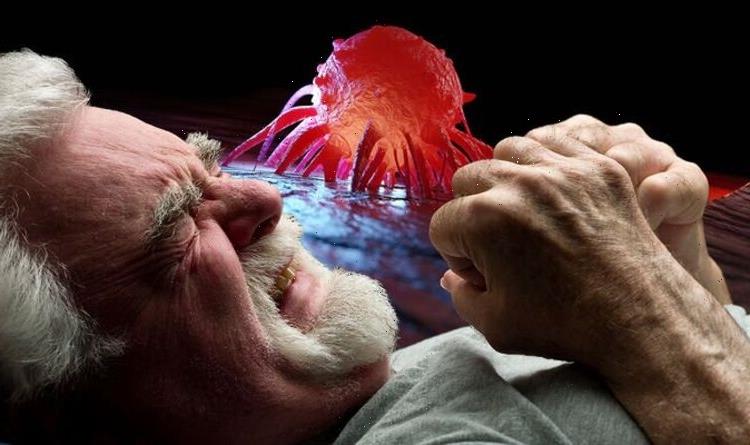Cancer symptoms: Top 14 early signs to look out for
We use your sign-up to provide content in ways you’ve consented to and to improve our understanding of you. This may include adverts from us and 3rd parties based on our understanding. You can unsubscribe at any time. More info
Key to surviving cancer is early detection. Left to their own devices, cancerous cells proliferate and spread to neighbouring regions of the body. Acting on the symptoms as soon as they arise provides a chance to arrest this process.
Unfortunately, cancer symptoms can either be non-existent or too subtle to notice in the beginning.
However, any bodily changes that are out of the ordinary should be investigated by a GP, advises the NHS.
According to Abbas Kanani, pharmacist at Chemist Click, how you wake up in the morning can be a major red flag.
Waking up with a sore throat that is “persistent” and has been there for over two weeks with no signs of improving is a telltale sign, warned Mr Kanani.

The same goes for a cough, said the pharmacist.
“Smokers often wake up with a cough in the morning. However, a persistent cough for longer than two weeks should be checked out. Especially if you smoke.”
Another telltale sign that may strike in the morning and bedevil you all day is fatigue.
Mr Kanani explained: “It’s normal to feel a little tired in the morning, but if this is not usual for you, or you are noticing fatigue lasting throughout the day, you should get this checked out.”
DON’T MISS
Vitamin D deficiency: The sign when you wake up [INSIGHT]
Cancer: Two signs to spot when going to the toilet [TIPS]
High cholesterol: The 43p snack that lowers levels [ADVICE]
Fatigue is particularly worrisome if it is accompanied by other worrying signs, he said.
“If you wake up in the morning and the bed is wet or damp from sweat, this indicates that you could have been experiencing night sweats,” explained Mr Kanani.
“Get this checked out with your GP, especially if night sweats are accompanied by fatigue, weight loss or bruising.”
General symptoms of cancer include:
- Unusual lump or swelling anywhere
- Unexplained weight loss
- Changes in your poo or pee.

How to reduce your risk
There are things you can do that make getting cancer less likely.
“Not smoking is the biggest thing you can do to reduce your risk of cancer,” explains Cancer Research UK.
The charity explains: “Chemicals in cigarette smoke get in to our blood stream and can cause damage around the body. If you smoke, the best thing you can do for your health is quit.”
Drinking less alcohol reduces your risk of cancer, it adds.

“It doesn’t matter what type of alcohol it is, it can still lead to damage.”
To keep your risk of alcohol-related harm low:
- Men and women are advised not to drink more than 14 units of alcohol a week on a regular basis
- If you drink as much as 14 units a week, it’s best to spread this evenly over three or more days
- If you’re trying to reduce the amount of alcohol you drink, it’s a good idea to have several alcohol-free days each week
- If you’re pregnant or trying to become pregnant, the safest approach is to not drink alcohol at all to keep risks to your baby to a minimum.
- Regular or frequent drinking means drinking alcohol most days and weeks.
“The risk to your health is increased by drinking any amount of alcohol on a regular basis,” warns the NHS.
Source: Read Full Article
